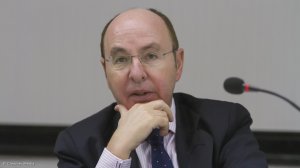JOHANNESBURG (miningweekly.com) – South Africa should consider appointing an independent minerals regulator to speed up minerals licensing, Herbert Smith Freehills Africa co-chair Peter Leon said during a webinar this week.
Responding to Patrick Leyden, who moderated the webinar entitled re-imagining the sub-Saharan mining sector, Leon said a recommendation made to an African National Congress (ANC) conference some ten years ago, to appoint an independent minerals regulator had unfortunately been rejected but should now be reconsidered. (Also watch attached Creamer Media video.)
Leyden, who is Herbert Smith Freehills director mining in South Africa, had directed a question to Leon on what regulatory measures African governments should implement during these challenging times to attract further and better investment.
On recalling the rejection of the independent minerals regulator recommendation, made to the ANC in Dr Paul Jourdan’s State intervention in the minerals sector submission, Leon said: “I think it’s something that should be reconsidered given the issues that South Africa has experienced with licensing delays, which you are well aware of, Patrick, with the Department of Minerals Resources and Energy’s lack of technocratic expertise.”
The first point made by Leon in his response to the regulatory measures African governments should implement now to attract further and better investment during these challenging times, was that administrative and Ministerial discretion should be avoided or minimised.
“Avoid at all costs, or as far as possible, high levels of administrative or Ministerial discretion, because that is the enemy of good governance in the mining sector,” Leon stated.
“You need to try and promote regulatory certainty and predictability in the sector as far as possible and you do that by having objective criteria in your mining code. You eliminate administrative or Ministerial discretion as far as possible by doing that.
“The other thing you need to do is have strict time limits for the making of decisions. Certainly based on experience in a number of Southern African countries, that’s a major issue,” he added.
Crucial was an open, online mining cadastre, where mining companies and applicants could see who has which rights without having to bring an access-to-information request to see who owns what.
He said that Ghana’s appointment of an independent minerals regulator in the early 1990s, had had a huge impact on the country’s mining sector.
“Then you have a technocratic body which advises the Minister on licensing. I think there’s a very strong case to say that what you need in the South Africa is the equivalent in the minerals sector of the South African Revenue Service.
Besides Ghana, Tanzania had also done so in 2017.
"How successful that’s been in Tanzania I’m not entirely sure. But in terms of what is a good mining code, which tries to reflect these principles, I’d say three African mining countries in the anglophone sphere stand out to me.
“The one is Botswana, which has really been an exemplar of this for a very long time. It’s mineral code, passed 20 years ago, has stood the test of time.
“The second is Ghana, which went through quite a significant process of mineral law reform in around 2006, and Kenya, interestingly enough, which has obviously very much an embryonic mining sector, took the advice of the World Bank and passed, I thought, a really first-class mining code about two years ago.
“Those to my mind in anglophone Africa are the standout examples of best practice and how to get things right,” Leon said.
EMAIL THIS ARTICLE SAVE THIS ARTICLE ARTICLE ENQUIRY
To subscribe email subscriptions@creamermedia.co.za or click here
To advertise email advertising@creamermedia.co.za or click here










